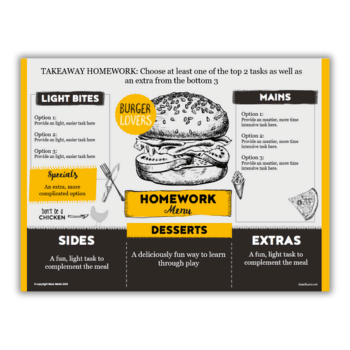Homework policy – Effective practice for today’s schools

How to create a clear and effective homework policy that promotes learning and fits today’s educational landscape…

- by Teachwire
- Classroom expertise and free resources for teachers

A homework policy is a set of guidelines that outlines your school’s expectations for assigning, completing and assessing homework.
A good homework policy will ensure consistency across classrooms and ensure that homework serves as a meaningful learning tool.
Research from the EEF shows that the average impact of homework is positive across both primary and secondary school, although primary homework has a smaller impact on average.
What is the DfE’s stance on homework?
Back in 2018, then education secretary Damian Hinds said that it was ultimately up to school leaders to decide whether to set homework and what the consequences should be for children who don’t complete it.
Homework policy considerations
The EEF recommends that when implementing a homework policy, you should consider the following:
- The quality of homework over the quantity
- Setting well-designed tasks that are linked to classroom learning
- Clearly setting out the aims of homework to pupils
- Understanding and addressing any barriers to completion, such as access to a learning device or resources
- Explicitly teaching independent learning strategies
- Providing high-quality feedback to improve pupil learning
- Monitoring the impact of homework on pupil engagement, progress and attainment
What should a homework policy contain?
A homework policy typically includes the following:
- Purpose: Describe the role of homework in reinforcing learning, practising skills or preparing for future lessons
- Amount and frequency: Specify how often teachers should assign homework and how long students should spend on it
- Types of homework: Clarify what sort of homework teachers will set, such as reading, research, or project-based tasks
- Deadlines and submission: Outline when homework is due and how pupils should submit it
- Support and resources: Explain what support resources are available
- Feedback and grading: Detail how you will assess homework
- Consequences for incompletion: This might include extra support, detentions or reduced grades
- Parental involvement: Address how much you expect parents to help with homework and how parents can contact you about it
- Use of AI: State your school’s position on whether you permit students to use AI when completing homework
Homework policy case study: Disbury Road Primary
Meet the school that’s trying a new approach to homework…
Didsbury Road Primary in Heaton Mersey, Stockport, has launched an initiative to engage children and parents in what they prefer to call ‘learning at home’, rather than ‘homework’.
Assistant headteacher Liza Ferdinand, explains that the catalyst for the project was a comment at parents’ evening. “The issue first came up in relation to homework tasks that we were setting for the school holidays,” Liza says.
“Some of the parents asked us why one of their children was being given homework, but the other, in a different year group, was not.
“That led to a staffroom discussion about how consistent our homework policy was and made us focus on how we can engage parents with learning at home, rather than homework.”
More harm than good
With the assistance of Institute of Education staff from the University of Manchester, Liza and colleague Laura Whitehead, a Y3 teacher, set about surveying their stakeholders’ attitudes to the setting of homework.
We gave parents and teachers a questionnaire. Four pupils from each year group, including Reception, took part in focus group interviews.
The survey revealed not only inconsistencies in the school’s homework policy but also in teachers’ views of the value of homework.
Almost half of the 17 staff who responded set homework during the holidays and not all were positive about the benefits of homework, with one teacher outlining the negative impact: “Homework can cause more harm than good. Apart from reading I don’t believe in setting homework at primary level.”
Another teacher recognised the challenges faced by children in squeezing homework into their already overcrowded lives, saying, “Children are very busy outside school with clubs and sports. Homework is hard to do sometimes.”
The questionnaire also raised the issue of whether homework should be cross-curricular or set in discrete subjects; 41% of teachers thought that activities in discrete subjects, notably English and maths, would be more beneficial.
Under pressure
“We were amazed by the parental response,” says Liza. “116 parents filled in the questionnaire. I think they were really pleased that we asked them.
“Although three-quarters of our parents claimed to be happy with the amount of homework we gave, it raised issues about whether we should put children under pressure to complete homework.
“Most parents said that they would prefer us to give them a bank of suggested activities which they could complete with their children in their own time.
“One parent explained her belief that holidays should be for processing what children have learnt. The pupils’ responses reflected this, too.”
Alternative to holiday homework
On the basis of their findings, the school decided to stop sending out holiday homework tasks. Instead, teachers provide suggestions for cross-curricular activities that parents can complete with their children in the holidays, or as extension activities in term-time.
We post a list of activities to enjoy at home on the website for each year group. We change this each term. The activities are largely practical or discussion-based and are not compulsory.
Staff do not monitor whether children complete them. However, we invite pupils to bring into school what they have done at home for ‘show and tell’.
There is also a plan to put aside an afternoon at the end of each half-term to showcase what pupils have done at home.
Home activities include both discussion and practical activities. We give Reception children, for instance, a series of questions about Bonfire Night. What did you see/hear/smell/eat on Bonfire Night? What shapes and colours did you see?
We also ask them to put a bird feeder outside and count how many different kinds of birds visit it. Meanwhile, we ask Y5 children, under the heading of history, if they can find any Anglo Saxon place names nearby, or a Norman castle they could visit, and to find out more about who defeated the Anglo Saxons.
Trending
Thinking skills
How does Liza respond to the charge that primary homework has no impact on pupil achievement? “I think it really depends on what it’s for,” she says.
“We intend for our learning at home activities to engage parents in what their children are learning in the classroom and extend it through discussion and activity at home.
“They embed the learning that goes on in the classroom and give it more purpose.
“There may be a question about whether consolidating what’s done in class really has any merit. However, what we’re promoting is discussing and sharing ideas, as well as developing listening and speaking skills – whether that’s in the museum or the park.
“There are lots of screens around us and this is about encouraging parents to create a space away from technology in which their children can develop their thinking skills.
“We also hope that children’s language and vocabulary will be developed because they’re discussing these ideas with an adult.”
The project seems to have been well-received to date; follow-up questionnaires and interviews are planned for later in the year.
Four tips for happy home learning
- Engage whole staff in discussion about the school’s homework policy, what their views are on the value of homework, and what they want children to get out of it.
- To ensure a consistent approach, put time aside at a staff meeting or inset day for everyone to draft and upload their suggestions for their year group’s home activities.
- The best way of engaging parents in learning at home is to consult the children on which activities they would like to be set. If children have an interest in the activities, they are more likely to go home and urge their parents to complete the tasks with them. Also ask parents for their views on the role of homework.
- Take advantage of opportunities to become involved in research projects facilitated by colleagues in higher education or teacher training providers. They can benefit your own professional development as well as your school.
Dr Amanda Barton is a freelance writer, educational consultant and teacher trainer. Follow her on Twitter at @amandabook2.
How to use homework as a motivator
If we expect our students to organise their time well, then we need to make the process of completing homework, and our expectations of them in terms of time and deadlines, as straightforward, simple and reasonable as possible.
This can be partly achieved by establishing consistent routines. Setting homework on the same day each week is an excellent way of helping students predict when they will be receiving homework, and giving them a chance to plan their time accordingly.
Right level of challenge
Once students know when to expect homework, the next step towards helping them feel motivated is to ensure that they can see themselves being successful, and achieving well in the homework they’ve been set.
That’s not to say that their homework has to be easy. Homework that’s too hard, to the point of being unachievable for a student is clearly bad – but the same can also be said of homework that’s so easy it can be completed almost effortlessly, without much thought.
Effort, in terms of the thought needing to be put into the task, can be an important lever for attaining success.
Teachers are the best judges of how much challenge should be presented by the work they set. Information gathered in lessons can usefully inform the homework that’s later developed and given to students.
One key aspect of effective homework is the extent to which it’s directly linked to the learning taking place in the classroom.
This also applies to the level of challenge the homework provides, in that it needs to match the level of challenge that your students are engaging with in the classroom.
Belonging and value
If someone had told me at the start of my teaching career that homework could help students feel a sense belonging in the classroom, and encourage them to value their learning more, I’d have looked at them dubiously.
Yet this is precisely what effective homework can achieve. Students will feel that they can confidently contribute to lessons when they:
- Know when to expect homework
- Can see that their homework is designed to help them retain new knowledge
- Recognise the format and content of certain questions, having previously tackled them in class
Education isn’t just about getting good grades and attaining the highest marks; it’s also about getting students to see the value in learning, so that they can carry robust independent study skills with them into the future.
As teachers, our duty is to think carefully about the homework we set, so that our students can develop confidence when learning about our subject, build important habits and achieve more.
An important part of achieving this is to establish a strong culture of integrity and respect for learning. When both students and their guiding voices at home are able to recognise the value of independent study, homework can become one of the most important drivers of student motivation.
To that end, one of the simplest things that any teacher can do is to value and talk about homework they assign with the same level of passion as they would with respect to their classroom teaching. Because the two are inherently connected.
Benefits of well-thought-out homework
With sufficient thought put into it, homework can provide…
- Teachers with invaluable data about their students, study habits and levels of focus
- Students with opportunities to solidify and add to their foundational knowledge across multiple subjects
- A way for students to build their confidence, practise their ability to focus, and develop reliable study habits and motivational techniques that will serve them well into adulthood
- Schools with a positive culture of self-managed learning and improvement
Jovita M. Castelino is a teacher with a special interest in applying cognitive science principles to teaching to maximise student learning. Her book, The Homework Conundrum, is available now (£16.99, Routledge).







